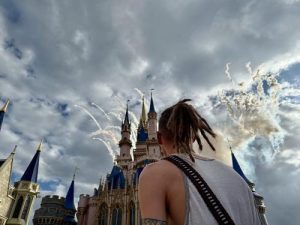Loneliness can be circumstantial, but it can also be a mindset, a false belief that we are alone in our minds/psyches. This is an artificial capsule we create around ourselves, when actually, like the boy in the photo, we are never alone.
On the other hand, sometimes loneliness really is circumstantial. We may be in a social situation where we are unrecognized or around people who don’t share our wavelength. There are also situations where we need to go solo. This can be especially hard on our inner child, who is more emotional, sensitive and without all the resources of our adult personality. Children are adaptable if at least one person is empathically attuned to them. You need to be that caring person for your inner child, sympathizing with their deprivation.
See the Zap Oracle card Unhappy Inner Child
WATCH THE REST OF THIS CARD AS AS VIDEO
“The highest, most decisive experience is to be alone with one’s own self. You must be alone to find out what supports you when you find that you can not support yourself. Only this experience can give you an indestructible foundation.” — C.G. Jung
This card may indicate an auspicious time for solitude.
The path of individuation can feel isolating, but some relative seclusion can be extremely developmental, giving you the space to discover and unfold your individuality. It is true that the more you work on yourself, the fewer will be those you can relate to as full equals. Don’t fall into self-pity or victimhood about this. No person is an island; we are all floating in the same ocean of consciousness.
Also, you don’t need your key allies to be at the same level of individuation. What is more crucial is that they share your commitment to consciousness. The more individuated person can mentor the one who is less developed. That is a classic and fulfilling form of relationship. It should, however, leave room for the less developed person to become the equal or surpass the mentor.
The path of individuation may sometimes be lonely, but being lost in a crowd of acquaintances is also lonely and worse in all sorts of ways.
Follow your individual path, accept the partial isolation, and you may discover it leading you to spiritual allies following their own individual paths to a place where many paths and errands meet.
Though you may not feel good about it, it is possible that this card may indicate an auspicious time for solitude.
Solitude and togetherness with others are two of the main variables that our lives need to fluctuate between. Many people undervalue the solitary side of the spectrum and experience it as a deprivation and hardship. We are social mammals, and research by Seligman and others has shown that people universally report being happier when other people are around. In solitude, many people become more subject to psychic entropy — a chaotic state of negative thought loops and emotions. Most psychopathology — eating disorder behavior, for example, happens in solitude, which is also where people contemplate suicide, etc. Even people who say they prefer solitude report being happier when in the company of others. But what makes us happier in the short run is not always what we need for our development or to do our most important work.
I used to bring my laptop to coffee shops and work on various tasks there. The presence of other people, even though I rarely relate to them, is a social stimulant. Like a cup of espresso, part of my brain lights up as I recognize different human types and overhear fragments of conversation. But like espresso, this stimulation can also be an unproductive addiction. Focusing on my work may be lessened by the presence of distractions, caffeinated bursts of social chatter, cell phones, and a whole mosaic of irrelevant perceptions. In solitude, I am more powerful. More of my inner resources are available to focus on what I need them to focus on rather than the inevitable fragmentation of energy spent reacting to whatever happens in the common space. In solitude, we can best concentrate on whatever is in our cauldron. Individuality is largely the product of solitude. Solitude is where most of the high-level creativity happens, the breakthroughs, the life-changing realizations, and yes, the dark nights of the soul, which are necessary for our spiritual development. As Jung says,
“Every advance in culture is, psychologically, an extension of consciousness, a coming to consciousness that can take place only through discrimination. Therefore, an advance always begins with individuation, that is to say, with the individual, conscious of his isolation, cutting a new path through hitherto untrodden territory. To do this, he must first return to the fundamental facts of his own being, irrespective of all authority and tradition, and allow himself to become conscious of his distinctiveness. If he succeeds in giving collective validity to his widened consciousness, he creates a tension of opposites that provides the stimulation which culture needs for its further progress.”
 ZapOracle.com home to the free 720-card Zap Oracle
ZapOracle.com home to the free 720-card Zap Oracle






